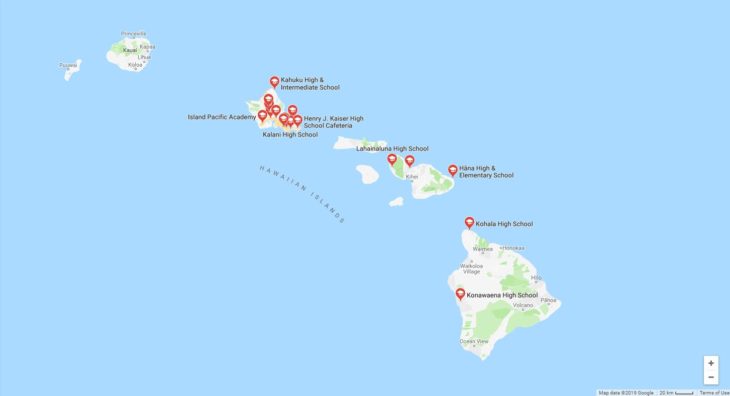Hawaii is the 50th and most recent state to enter the United States. It consists of eight main islands and is located in the Pacific Ocean. Hawaii is divided into five counties: Honolulu, Hawaii, Maui, Kauai, and Kalawao. Each county has its own mayor-council form of government with legislative authority vested in a nine-member council. The five counties are further divided into a total of 105 school districts. The school districts are responsible for providing education to students from kindergarten through 12th grade.
The largest public school district in Hawaii is the Hawaii Department of Education (HIDOE). This district serves all five counties and covers nearly all aspects of education from pre-K through grade 12. HIDOE provides education to over 180,000 students statewide and employs nearly 20,000 teachers and staff members across 1,000 schools in Hawaii‘s public school system. HIDOE also works closely with numerous other government entities such as the State Board of Education (SBOE) and the University of Hawaii System (UHS). These entities provide additional educational resources to Hawaiian students by offering college preparatory classes, special education services, career counseling programs, after-school activities, and more.
There are many public and private high schools in the state of Hawaii. It is rather difficult for you to choose one that fits you most. In order for you to better evaluate your choice, we have ranked these high schools based on latest SAT/ACT scores, graduation rates, and state test scores from the Hawaii Department of Education. See below for top 8 high schools throughout the state of Hawaii.
| # | High Schools | Honor |
| 1 |
Aiea High School
Hawaii Department of Education School District City and County of Honolulu 98-1276 Ulune St Aiea, HI 96701 Telephone: (808) 483-7300 |
Bronze |
| 2 |
Education Laboratory: A Hawai’i New Century Public Charter School
Hawaii Department of Education School District City and County of Honolulu 1776 University Ave Honolulu, HI 96822 Telephone: (808) 956-7260 |
Bronze |
| 3 |
Kaimuki High School
Hawaii Department of Education School District City and County of Honolulu 2705 Kaimuki Ave Honolulu, HI 96816 Telephone: (808) 733-4900 |
Bronze |
| 4 |
Kalaheo High School
Hawaii Department of Education School District City and County of Honolulu 730 Iliaina St Kailua, HI 96734 Telephone: (808) 254-7900 |
Bronze |
| 5 |
Kea’au High School
Hawaii Department of Education School District Hawaii County 16-725 Keaau-Pahoa Rd Keaau, HI 96749 Telephone: (808) 982-4220 |
Bronze |
| 6 |
Leilehua High School
Hawaii Department of Education School District City and County of Honolulu 1515 California Ave Wahiawa, HI 96786 Telephone: (808) 622-6550 |
Bronze |
| 7 |
McKinley High School
Hawaii Department of Education School District City and County of Honolulu 1039 South King St Honolulu, HI 96814 Telephone: (808) 594-0400 |
Bronze |
| 8 |
Roosevelt High School
Hawaii Department of Education School District City and County of Honolulu 1120 Nehoa St Honolulu, HI 96822 Telephone: (808) 587-4600 |
Bronze |

Hawaii geography
Due to the high volcanic activity in Hawaii, earthquakes are very frequent, the state ranks third (after Alaska and California) in the United States of America in terms of their number. The coasts of the Hawaiian Islands are also hit by tsunamis and tropical storms from time to time.
Nevertheless, despite the elements, Hawaii has the mildest climatic conditions of any state in the United States. The Hawaiian Islands are located in the tropics, but the trade winds blowing from the east somewhat reduce the temperature and humidity characteristic of this region. The rainy season lasts from October to April, with very little rainfall in summer. There are almost no seasonal temperature fluctuations here, in the capital and largest city of Honolulu, located on the island of Oahu, in January the average temperature ranges from 19°C to 27°C, and in August – from 24°C to 32°C. In the city of Hilo on the island of Hawaii, in January, the temperature usually ranges from 18°C to 26°C, and in August – from 21°C to 28°C.
The Hawaiian Islands, located thousands of kilometers from the mainland, are one of the most isolated regions on the planet. It is not surprising that many endemic (that is, found nowhere else) species of plants and animals lived here, many of which, unfortunately, have become extinct or are in danger of extinction. Interestingly, by the time people appeared on the islands, there were only two types of mammals: the monk seal and the Hawaiian bat.
Several nature reserves have been established in Hawaii, including two national parks (the Hawaiian Volcanoes Park mentioned above and the Haleakala National Park on the island of Maui); the huge (about 360,000 km 2) Papahanaumokuakea National Marine Reserve; more than twenty state-managed parks; numerous wildlife sanctuaries and recreation areas.

